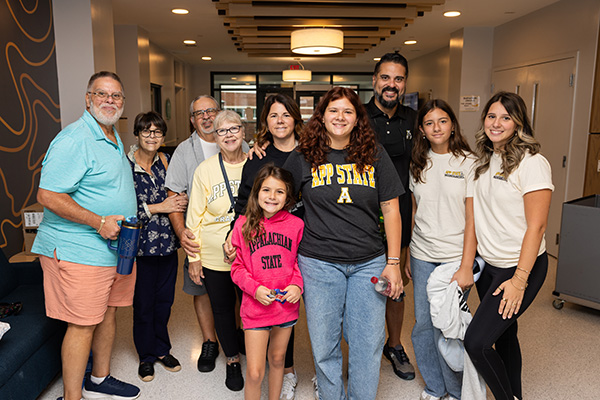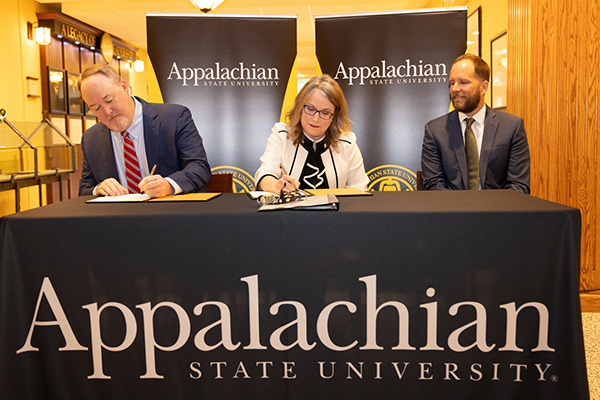BOONE, N.C. — This fall, Appalachian State University reports continued steady growth, welcoming a record-setting enrollment of 21,798 Mountaineer students — a 1.1% increase over fall 2024. Fall 2025 enrollment at App State was boosted by a 28% rise in online students and the highest-ever number of transfer students.
The 2025 census at App State — calculated on the 10th day of classes — includes 19,732 undergraduate students, the highest number to date. Joining the university this fall are 3,993 new first-year students and a record 1,670 new transfer students. Graduate student enrollment also increased 2.8% year over year, with 2,066 students enrolled in graduate studies at App State.
“Appalachian State University is operating from a position of strength in a challenging time for the higher education industry,” said App State Chancellor Heather Norris. "Our strong enrollment is a reflection of intentionally managed growth, with increases in App State Hickory and online student populations again this year, coupled with a continuation of steady enrollment at the Boone campus."
“We have built a university culture that is deeply committed to ensuring student success,” she added, “and we continue to develop innovative academic programs that both meet students’ needs and respond to rapidly evolving market demands.”
Strategic, managed growth in Boone, Hickory and online
App State’s steady and consistent growth is guided by strategic planning and market-focused programming across its Boone and Hickory campuses and App State Online.
The Boone campus enrollment totals 18,124 in fall 2025. Over the past six years, the enrollment of students attending classes at the Boone campus has fluctuated by less than 3% from year to year:
- Fall 2020: 18,510
- Fall 2021: 19,031
- Fall 2022: 18,684
- Fall 2023: 18,951
- Fall 2024: 18,601
- Fall 2025: 18,124
At App State’s Hickory campus, Mountaineer student enrollment grew by 2.3% from fall 2024 to fall 2025. In its third year of operation, App State Hickory serves 523 students — a population that includes 276 first-generation students and 380 students from North Carolina counties classified as rural by the state’s Department of Commerce.
The university recognizes the opportunities to expand access to a high-quality, cost-effective education in the Catawba Valley area, which was previously the largest metropolitan area in the state without a four-year, public university campus. App State has actively engaged with government, educational, industry and civic leaders to analyze labor market data and student demand, ensuring that programs lead to positive career outcomes.
The university is also strengthening its partnerships with other local institutions, including Lenoir-Rhyne University, Catawba Valley Community College, Caldwell Community College and Technical Institute and the North Carolina School of Science and Mathematics - Morganton, which has already led to the creation of new “2+2” transfer agreements and research mentorship programs.
App State Online programs have experienced growth for the sixth consecutive year, enrolling 3,216 students — almost 15% of the total student body at App State and a nearly 28% increase over fall 2024. Online enrollment includes 443 students in App State’s five Project Kitty Hawk-supported Flight Path programs, which are tailored for adult learners. App State is developing a sixth Flight Path program in marketing, set to launch in spring 2026.
Expanding transfer pathways to an App State education
In fall 2025, 5,351 App State undergraduates — or 27% — are students who entered the university after transferring from another institution — the largest transfer student population in the school’s history. Enrollment of new transfer students increased nearly 6% over fall 2024.
In support of transfer students, the university has secured new and renewed agreements with 33 North Carolina community colleges through its Aspire Appalachian program. The program provides a streamlined path for students enrolled at partner schools to complete their bachelor’s degrees at App State.
“Our Aspire program is a strong example of how App State works to remove barriers and provide solutions that help transfer students thrive and graduate with less debt,” Norris said.
App State’s strong support of its transfer student population has earned the university the reputation of being one of the most transfer-friendly schools in both the state and the nation. For nine consecutive years, App State has been named to Phi Theta Kappa’s Transfer Honor Roll, which recognizes four-year colleges and universities across the country for developing dynamic and innovative pathways that lead to success among community college transfer students. And myFutureNC has recognized Aspire Appalachian as a Champion for Attainment for advancing educational access and degree completion rates for transfer students across the state.
App State transfer students represent nearly 140 community colleges across the nation, with 70% of transfer students coming to the university from community colleges. The degree completion rate for North Carolina community college students who transferred to App State is more than 22% above the national average.
Increasing access and supporting student success — from middle school to college graduation
App State’s focus on student success and its commitment to expanding access to higher education are evidenced by strong enrollment numbers and positive student outcomes data.
The university’s fall 2025 enrollment includes 6,589 first-generation students, who represent 33% of the total undergraduate student population at App State. A student is considered “first-generation” if neither parent has completed a bachelor’s degree.
Additionally, App State enrolls 5,843 students from rural North Carolina counties for fall 2025, which is a 2.3% increase over fall 2024. These students represent one-third of the total population of in-state, degree-seeking undergraduate students at App State.
Through its College Access Partnerships programs, App State ensures that access to higher education is available for thousands of middle and high school students in rural areas across the Northwest North Carolina region. These programs, which include Gaining Early Awareness and Readiness for Undergraduate Programs (GEAR UP) and On Ramp Appalachia, provide regional students — as well as their families and teachers — with resources and programming to help them succeed throughout their college careers.
App State’s student retention and graduation rates — two measurements commonly used in higher education to measure student success — remain strong and are some of the highest in the nation. The university’s overall 2025 first- to second-year retention rate — a primary performance indicator for institutions across the country — is 83.9%, well above the latest national average of 77.5%.
At 56%, the university’s four-year graduation rate continues to be more than 60% above the national average.
“At App State, we are wholly focused — across all areas of the university — on ensuring our students thrive in a supportive learning environment and graduate on time,” said Norris. “Improving four-year graduation rates remains a central priority, as they are a key indicator of both institutional effectiveness and student success.”
An economic impact study by labor analytics firm Lightcast found that, compared to high school graduates in North Carolina, App State graduates see average increased earnings of $31,100 per year with bachelor’s degrees, $44,800 per year with master’s degrees and $68,200 per year with doctorates.
Nearly 115,000 of App State’s living alumni, or 75%, are located within North Carolina, where they make lasting and impactful contributions to their respective communities. In fiscal year 2021–22, the increased earnings and productivity of App State alumni generated $140.7 million in added income for the regional economy (Watauga, Ashe, Avery, Caldwell and Wilkes counties), according to the Lightcast study. Statewide, the tens of thousands of App State grads employed across North Carolina generated $1.9 billion in added income.
Additionally, App State’s rural graduates go on to contribute to the rural economic development of North Carolina. According to App State’s Alumni Association, 66,527, or 43%, of the more than 153,000 Mountaineer alumni live and work in Tier 1 and Tier 2 counties in North Carolina, contributing to the state’s growing economy.
All numbers reported reflect App State’s fall 2025 census data as of Aug. 29. The University of North Carolina System Office determines the census date to be the 10th day of each fall and spring semester, by which all students should be registered for all of their courses for the semester.
What do you think?
Share your feedback on this story.
The degree programs in health care management, supply chain management, accounting, criminal justice, and organizational leadership and learning are designed for working adults
About Appalachian State University
As a premier public institution, Appalachian State University prepares students to lead purposeful lives. App State is one of 17 campuses in the University of North Carolina System, with a national reputation for innovative teaching and opening access to a high-quality, cost-effective education. The university enrolls more than 21,000 students, has a low student-to-faculty ratio and offers more than 150 undergraduate and 80 graduate majors at its Boone and Hickory campuses and through App State Online. Learn more at https://www.appstate.edu.

















